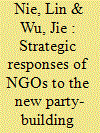|
|
|
Sort Order |
|
|
|
Items / Page
|
|
|
|
|
|
|
| Srl | Item |
| 1 |
ID:
184087


|
|
|
|
|
| Summary/Abstract |
Over the last decade, the Chinese Communist Party (CCP) has sought to assimilate the third sector – non-governmental organizations (NGOs) – through its party-building campaign. This article examines NGOs’ strategies in response to this campaign, based on in-depth interviews with 64 NGOs and local cadres. We find that NGOs have developed three main strategies to respond to the CCP’s attempts to penetrate their organizations. First, NGOs embedded in the party-state system and those affiliated with private enterprises tend to acquiesce to party building out of habit and for compliance reasons, respectively. Second, those with multiple stakeholders generally compromise in the party-building process, acting as passive compliers if they depend more on non-state resources, or active players if they rely more on state resources. Third, civic NGOs that advocate causes inconsistent with the ruling regime might avoid party building as a resistant strategy, by either disguising their nonconformity or escaping from the control of the ruling regime entirely. NGOs’ strategic responses are contingent on their negotiating power, which results from their resource dependence and the party’s enforcement dilemmas. This article contributes to our understanding of the recent party-building campaign from an institutional perspective, and enriches our knowledge about relations between the party and the third sector.
|
|
|
|
|
|
|
|
|
|
|
|
|
|
|
|
| 2 |
ID:
183800


|
|
|
|
|
| Summary/Abstract |
How do international norms diffuse in culturally heterogeneous and politically conservative environments? This article examines the norm adaptation strategies of international nongovernmental organizations (INGOs) in China. Through in-depth interviews with INGO representatives operating in the HIV/AIDS, LGBT, labor, animal rights, and gender-related fields in China, we find that INGOs have developed various norm adaptation strategies in response to local social and political barriers. First, INGOs working with new or low-consensus norms would strategically disregard those norms by not mentioning them during operation to avoid resistance from domestic society. Second, INGOs advocating norms that are inconsistent with the regime often adopt a norm containment approach, limiting the norm's degree and scope in exchange for operating space to achieve domestic compliance and meet international expectations. Third, INGOs advocating norms consistent with the ruling regime might adopt a norm signaling approach to obtain authorities' recognition and government support. This article contributes to our understanding of the recent Overseas NGOs Law and its influence on INGOs' transnational advocacy work in China, and enriches our knowledge of the dynamic norm adaptation process.
|
|
|
|
|
|
|
|
|
|
|
|
|
|
|
|
|
|
|
|
|